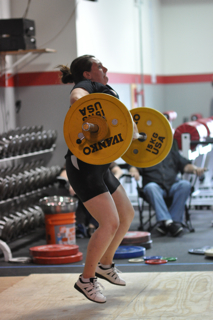 My old weight lifting coach, from my days as a weight room supervisor at BYU Hawaii, Evan Nakachi taught me four keys needed in every conditioning program. The four keys are (1) proper training, (2) proper nutrition, (3) proper rest and recovery, and (4) staying injury free. A training program that does not take all four of these areas into consideration is incomplete. Not just an athlete but any person engaging in a regular program of exercise will never be able to reach their full potential without addressing each of these four areas.
My old weight lifting coach, from my days as a weight room supervisor at BYU Hawaii, Evan Nakachi taught me four keys needed in every conditioning program. The four keys are (1) proper training, (2) proper nutrition, (3) proper rest and recovery, and (4) staying injury free. A training program that does not take all four of these areas into consideration is incomplete. Not just an athlete but any person engaging in a regular program of exercise will never be able to reach their full potential without addressing each of these four areas.
PROPER TRAINING
Everyone needs to have a proper program of training. The objectives of a training program will be dictated by your, lifestyle and personal goals. Occupation, responsibilities, family, time constraints and so forth should all be taken into consideration to develop a realistic program of training that will help improve your performance, energy and ability in all aspects of life. If you are an athlete the specific demands of your sport are going to be very influential on the design of your strength training and conditioning program.
PROPER NUTRITION
You will cut yourself short of gaining the greatest benefit from the hard work put into your training and exercise if you are consuming an unbalanced, deficient or unhealthy diet. To achieve optimal nutrition it is recommended to limit or eliminate junk food. A well balanced diet containing a proper ratio of the three macro-nutrients; carbohydrates, fats and proteins is recommended.
Learn how to use the glycemic index or what researchers are now calling the glycemic load to plan meals before, during and after training. The glycemic load is simply a measurement tool used to determine how different foods affect blood sugar levels. Research in sports nutrition has shown that pre-exercise, during exercise and post exercise meals can greatly impact your performance.[1]
The latest fad diets commonly marketed in popular books and info commercials may work to help some people lose pounds quickly but are rarely successful when it comes to maintaining a healthy weight long term and do not take sports performance into consideration.[2] The majority of these fad diets are not capable of meeting the specific needs of the athlete. Carbohydrates, protein and fat should, like a proper training program, be determined by the athlete’s sport, lifestyle and personal objectives. In addition an athlete needs to consume all the essential micro-nutrients; vitamins and minerals necessary for maintaining optimal health.
PROPER REST AND RECOVERY
The tendency to over train is common especially among athletes. Improvement in sport and specifically in strength training and conditioning does not happen only as a result of practice but as a result of proper rest after practice. Learning to relax is a highly beneficial component in any program of exercise.
If possible include massage, acupuncture or another holistic therapy as part of the recovery program. Massage is one of the oldest forms of therapy and has been proven to reduce stress and promote relaxation. This alone can give any serious athlete and invaluable advantage.
In strength and conditioning there exists a theory commonly known as the overload principle.[3] As an athlete’s body adapts to the physical stress it has been subjected too through training one must increase the difficulty of training to continue to produce a conditioning effect.
STAYING INJURY FREE
The final key is to stay injury free. Avoiding injury is not something that just happens through good luck. It is a skill that must be acquired. Following the three fore mentioned keys will reduce the probability of becoming injured. Correct exercise selection and proper exercise technique, learning correct sports technique and developing skills such as how to de-accelerate your body, change direction, fall, roll, maintain posture and improve your overall proprioceptive awareness will all help safe guard against injury.
Include exercise techniques into your training program that will strengthen the integrity and stability of your joints. Exercises that will strengthen your rotator cuff, shoulder flexibility, ankle stability, back and so forth should all be utilized. Pay attention to how your body feels. If you are overly fatigued and tired stop if you are doing something that is hurting don’t do it.
CONCLUSION
Make sure whenever you design a training program for yourself or if you choose to work with a professional include each of these four keys into your planning. Doing so will ensure proper preparation for any sport along with a more successful program of training.




